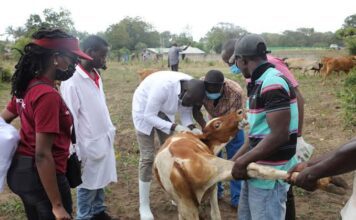Animal health experts in Nigeria have reported a significant annual loss of N4.5 billion due to Newcastle disease, attributed to insufficient veterinary services.
Dr. Moses Arokoyo, the President of the Nigerian Veterinary Medical Association, disclosed this troubling information in Abuja, emphasizing that the disease, caused by paramyxovirus, spreads rapidly among poultry birds.
Newcastle disease, as described by the United Kingdom Department of Agriculture, Environment and Rural Affairs, is a highly contagious infection that impacts poultry and various bird species.
The disease is triggered by virulent strains of the ND virus, leading to diverse clinical symptoms in affected birds and causing substantial mortality rates, particularly among young birds.
“The disease can present in acute form ranging to mild or subclinical disease. The signs depend on which body system the strain of the virus predominantly affects (the respiratory, digestive, or nervous system) and can have a sudden onset and high mortality.
“Signs include quietness, depression, drops in feed/water intake, and for birds laying eggs, a high proportion of eggs laid will have abnormal (soft) shells.
“There may also be respiratory distress such as gasping, coughing, sneezing, gurgling and rattling, yellowish green diarrhoea or nervous signs such as tremors, incoordination, twisted necks, drooping wings and paralysis,” it added
Dr. Arokoyo emphasized that various bird species, including chickens, turkeys, and wild birds like ostriches, are susceptible to Newcastle disease.
He stressed that the significant financial losses incurred due to this disease could have been utilized for productive endeavors or development projects if adequate veterinary services were available in rural areas.
The president of the Nigerian Veterinary Medical Association highlighted the crucial role of veterinarians in reducing the country’s animal disease burden, lamenting that the neglect of the profession leads to substantial losses from preventable diseases annually.
He pointed out that the current ratio of one veterinarian to 3,000-4,000 animals is grossly insufficient to address the nation’s disease burden and nutrition security.
Dr. Arokoyo emphasized that 75% of emerging and re-emerging diseases originate from animals, and unless a large number of veterinarians are employed and deployed to remote areas, the country will continue to experience an escalation of zoonotic diseases.
“If we want to address the problem and ensure food security as President Bola Tinubu has declared an emergency on food security, then we need to change the status quo.
“We need to employ more veterinarians, build capacity and empower the veterinarians to do the needful to secure our food and protein source,” he advised.
